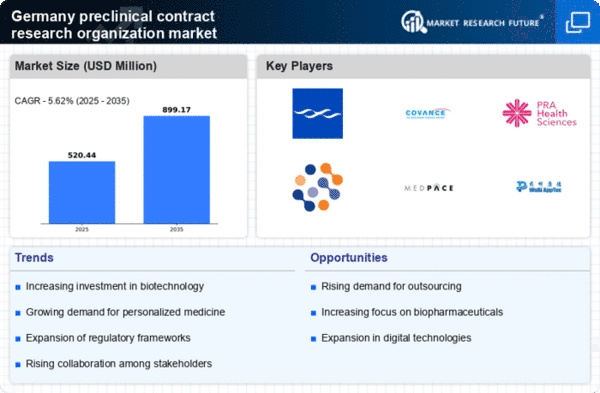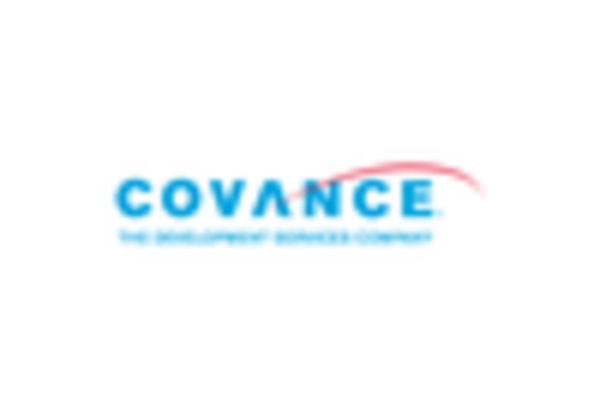Increasing Regulatory Support
Regulatory bodies in Germany are increasingly supportive of the preclinical cro market, facilitating a more streamlined approval process for new drugs. The Federal Institute for Drugs and Medical Devices (BfArM) has implemented initiatives aimed at reducing bureaucratic hurdles, which is likely to encourage more companies to engage in preclinical research. This regulatory environment fosters innovation and enhances the attractiveness of the preclinical cro market for both domestic and international firms. Furthermore, the collaboration between CROs and regulatory agencies is expected to improve compliance and safety standards, ultimately benefiting the entire drug development ecosystem. As regulations evolve, the preclinical cro market may witness a rise in demand for services that ensure adherence to these new guidelines.
Growing Focus on Rare Diseases
The Preclinical CRO market in Germany is witnessing a growing focus on rare diseases, which presents unique opportunities for CROs. With approximately 7,000 rare diseases affecting millions, there is an increasing need for specialized research and development. Pharmaceutical companies are investing in the development of orphan drugs, which are often eligible for incentives such as market exclusivity and tax credits. This trend is likely to drive demand for preclinical services tailored to rare disease research. As more organizations recognize the potential profitability of addressing unmet medical needs, the preclinical cro market is expected to expand. The emphasis on rare diseases may also lead to innovative research methodologies, further enhancing the capabilities of CROs in this niche area.
Advancements in Research Technologies
Technological advancements are significantly influencing the preclinical cro market in Germany. Innovations such as high-throughput screening, in vivo imaging, and bioinformatics are enhancing the efficiency and accuracy of preclinical studies. These technologies enable researchers to gather data more rapidly, which is crucial in the competitive landscape of drug development. The integration of artificial intelligence and machine learning into research processes is also gaining traction, potentially reducing the time and cost associated with preclinical trials. As a result, CROs that adopt these advanced technologies are likely to attract more clients, thereby driving growth in the preclinical cro market. The ongoing evolution of research methodologies indicates a promising future for organizations that can leverage these advancements effectively.
Rising Investment in Biopharmaceuticals
The preclinical CRO market in Germany is experiencing a surge in investment, particularly in the biopharmaceutical sector. With the biopharmaceutical market projected to reach €50 billion by 2026, the demand for preclinical services is likely to increase. This investment trend is driven by the need for innovative therapies and the growing number of clinical trials. As companies seek to expedite drug development processes, preclinical contract research organizations (CROs) are becoming essential partners. The influx of funding not only enhances research capabilities but also fosters collaborations between academia and industry, further propelling the preclinical cro market. This dynamic environment suggests that the market will continue to expand as more biopharmaceutical companies emerge, necessitating robust preclinical support.
Collaboration with Academic Institutions
Collaboration between preclinical CROs and academic institutions in Germany is becoming increasingly prevalent, fostering innovation and research excellence. These partnerships allow for the sharing of resources, expertise, and cutting-edge technologies, which can enhance the quality of preclinical studies. Academic institutions often possess advanced research capabilities and access to unique patient populations, making them valuable allies for CROs. This synergy not only accelerates the drug development process but also contributes to the overall growth of the preclinical cro market. As more CROs seek to establish collaborations with universities and research centers, the landscape of preclinical research is likely to evolve, leading to more robust and effective drug development strategies.
















